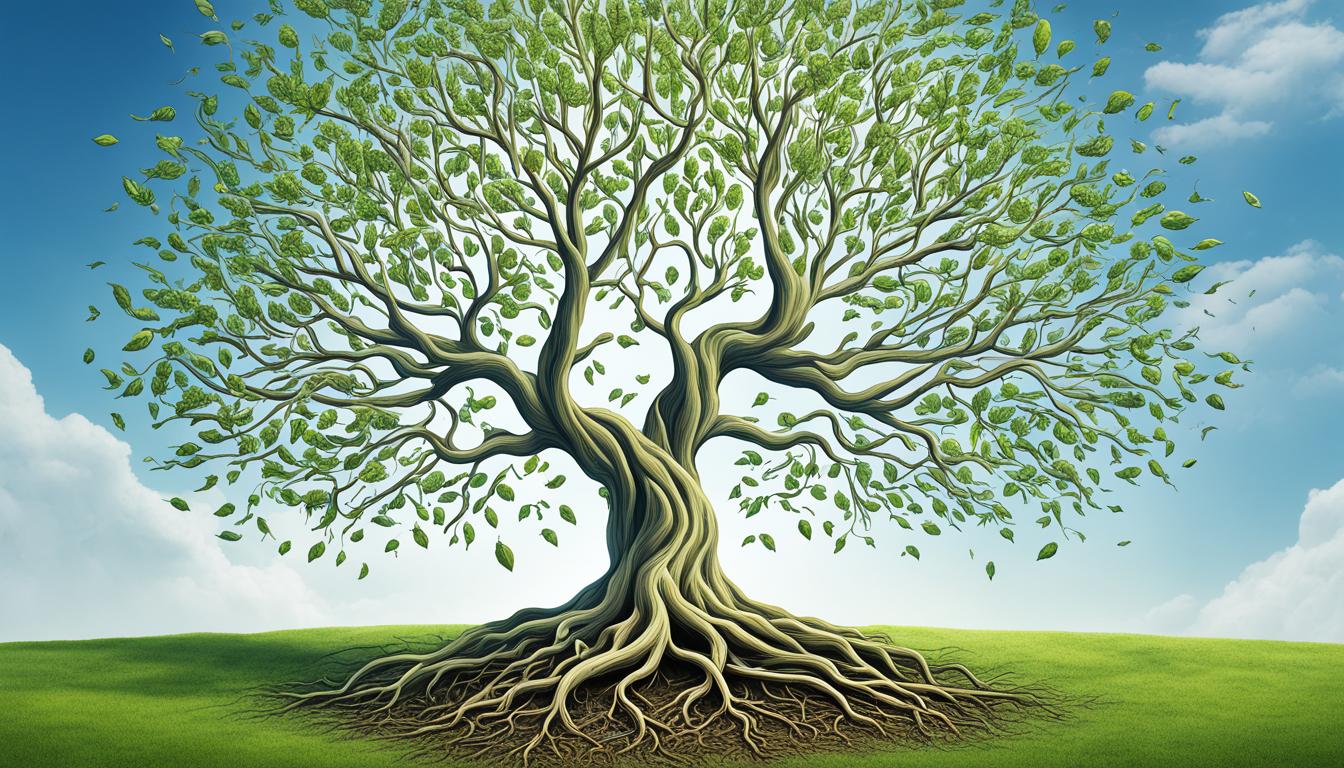“You only lose what you cling to.” – Buddha
Welcome to a journey of emotional liberation and spiritual growth. In the pursuit of a liberated life, the concept of nonattachment holds immense power. Rooted in Buddhist philosophy, nonattachment teaches us to let go of attachments to people, things, and outcomes. It is through this practice that we can experience true freedom and embrace the impermanence of all things.
- Cultivating nonattachment leads to emotional liberation and spiritual growth.
- Nonattachment means embracing impermanence and flowing with the river of life without judgment or resistance.
- Mindfulness practice is key to cultivating a wise and compassionate relationship with our emotions and experiences.
- Embracing nonattachment can lead to inner peace and resilience.
- Through nonattachment, we find freedom from attachment to outcomes and desires, fostering gratitude and compassion.
Understanding Detachment and Non-attachment
Detachment and non-attachment are often used interchangeably, but they have distinct meanings and practices. Detachment involves consciously disengaging from emotions, people, or situations that cause distress. It is about creating an emotional buffer to shield yourself from negative impacts. Letting go of attachments through detachment allows you to release what no longer serves you, freeing yourself from unnecessary suffering.
Non-attachment, on the other hand, goes beyond separation. It is about embracing the impermanence of all things and engaging with life fully without getting attached to specific results. By releasing the need for control and accepting the unpredictable nature of existence, you can experience a deep sense of freedom and inner peace. Non-attachment is a profound practice that encourages acceptance and equanimity.
Ancient texts and philosophies explore detachment and non-attachment as means to achieve inner tranquility. The Bhagavad Gita, a sacred Hindu scripture, emphasizes detachment from the fruits of our actions, guiding us to act without attachment to outcomes. The Stoic philosophers, such as Epictetus and Marcus Aurelius, teach the importance of detaching ourselves from external circumstances and finding inner peace amidst adversity.
Through detachment and non-attachment, you can cultivate an outlook of surrender and flow, letting go of the need to control everything. By embracing impermanence and accepting life as it unfolds, you can experience greater peace, resilience, and fulfillment.

The Power of Non-attachment in Relationships and Work
Non-attachment is a concept that holds immense power and can significantly impact both our relationships and work life. In relationships, practicing non-attachment means loving and supporting the other person without expecting anything in return. It allows us to let go of the need for external validation and find a sense of freedom within ourselves. When we embrace non-attachment, we can live our lives authentically, without depending on others for our happiness.
In the workplace, non-attachment can be a game-changer. It helps us remain calm and composed in stressful situations, allowing us to approach challenges with clarity rather than being overwhelmed by emotions. By shifting our focus from attachment to outcomes, we can concentrate on finding effective solutions and make better decisions. Non-attachment enables us to maintain a positive outlook and stay motivated, even in the face of setbacks or difficulties.
Practicing non-attachment in both relationships and work has numerous benefits. It fosters personal growth by encouraging us to let go of the need to control or possess others, which in turn allows for more authentic connections and harmonious interactions. Non-attachment also contributes to emotional well-being by reducing attachment-related anxieties and promoting a greater sense of inner peace and contentment.
| Benefits of Non-attachment in Relationships and Work | How it Impacts |
|---|---|
| 1. Freedom from expectations and attachments | Relationships: Allows for personal growth, authenticity, and harmonious connections. Work: Enables focus on effective problem-solving and better decision-making. |
| 2. Emotional liberation and inner peace | Relationships: Reduces anxieties related to attachment and enhances emotional well-being. Work: Promotes resilience and reduces stress, leading to greater job satisfaction and contentment. |
| 3. Personal growth and self-discovery | Relationships: Encourages self-reflection, growth, and the development of authentic connections. Work: Provides opportunities for personal and professional development, leading to increased job satisfaction and fulfillment. |
By embracing non-attachment in both our relationships and work, we create an environment that nurtures personal growth, emotional well-being, and harmonious interactions. It allows us to let go of expectations, be present in the moment, and develop a greater sense of gratitude and compassion. Non-attachment opens doors to new possibilities and empowers us to lead a more fulfilled and liberated life.

The Benefits of Non-attachment
Practicing non-attachment brings a myriad of benefits to your life. By embracing freedom from attachment to outcomes and desires, you can unlock greater emotional freedom and experience inner peace. Non-attachment also cultivates resilience, enabling you to accept life’s inevitable challenges without resistance. It fosters a deep sense of inner peace, reducing anxiety and creating space for personal and spiritual growth. Letting go of attachments to material possessions and external circumstances allows you to find joy and contentment in the present moment, while developing a greater sense of gratitude and compassion.
| Benefits of Non-attachment | Description |
|---|---|
| Freedom from Attachment | Experience liberation from attachment to outcomes and desires |
| Spiritual Growth | Cultivate personal and spiritual growth through the practice of non-attachment |
| Resilience | Build resilience by accepting life’s challenges without resistance |
| Inner Peace | Cultivate a deep sense of inner peace and reduce anxiety |
By incorporating non-attachment into your daily life, you can unlock these transformative benefits and embark on a journey towards a liberated and fulfilling existence.

The Power of Letting Go
Letting go of attachments is not an easy task, but it is a powerful practice that can profoundly impact your life. When you release attachments to outcomes and desires, you free yourself from the burden of expectations. This allows you to live in the present moment, savoring each experience without being chained to the past or future. By embracing non-attachment, you gain the resilience to navigate life’s challenges with grace and acceptance. Inner peace becomes your foundation, allowing you to cultivate a deep sense of gratitude and compassion for yourself and others.
Conclusion
Nonattachment is a transformative practice that offers the path to emotional liberation and spiritual growth. It teaches you to let go of attachments and cultivate a wise and compassionate relationship with your emotions, experiences, and the impermanence of all things.
By practicing non-attachment, you can experience true freedom in your life. Letting go of attachments allows you to develop resilience in the face of challenges, as you learn to navigate life’s ups and downs with an open heart and mind.
Incorporating mindfulness practice into your daily life and embracing the principles of non-attachment can lead to profound personal growth. It can help you develop a deep sense of self-awareness and allow you to live in the present moment with a greater sense of clarity and peace.
Embrace nonattachment and embark on a journey towards a liberated and fulfilling life. By cultivating a mindful and non-attached mindset, you can experience emotional liberation, spiritual growth, and a profound sense of contentment.
FAQ
What is nonattachment?
Nonattachment is a practice that involves letting go of attachments to people, things, and outcomes. It is about embracing the impermanence of all things and flowing with the river of life without judgment or resistance.
How is nonattachment different from detachment?
Detachment refers to consciously disengaging from emotions, people, or situations that cause distress. Nonattachment, on the other hand, goes beyond separation and delves into acceptance and equanimity. It involves embracing the impermanence of all things and engaging with life fully without getting attached to specific results.
How can practicing nonattachment benefit relationships and work?
Nonattachment in relationships means loving and supporting others without expecting anything in return, fostering a sense of freedom and enabling us to live our lives without depending on others for happiness. In the workplace, nonattachment helps us remain calm and composed in stressful situations, focus on solutions rather than emotions, and maintain a positive outlook in the face of challenges.
What are the benefits of nonattachment?
Nonattachment allows us to experience freedom from attachment to outcomes and desires, leading to greater emotional freedom and inner peace. It builds resilience as we learn to accept the challenges of life without resistance and fosters personal and spiritual growth. Nonattachment also cultivates a sense of gratitude, joy, and compassion by letting go of attachments to material possessions and external circumstances.
How can nonattachment contribute to emotional liberation and spiritual growth?
Nonattachment teaches us to let go of attachments and cultivate a wise and compassionate relationship with our emotions, experiences, and the impermanence of all things. By practicing nonattachment, we can experience true freedom in our lives, develop resilience in the face of challenges, and find inner peace. Incorporating mindfulness practice and embracing the principles of nonattachment can lead to personal growth, harmonious relationships, and a sense of fulfillment.

